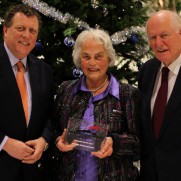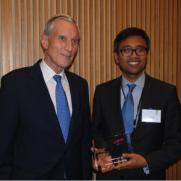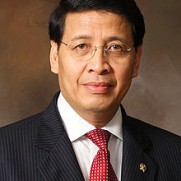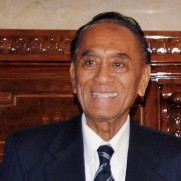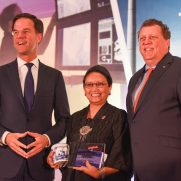Laureates
- Laureate 2012: Mrs. Joty ter Kulve-Van Os
- Laureate 2013: Dr. Bernard Bot
- Laureate 2014: Dr. Hassan Wirajuda
- Laureate 2015: Dr. Arifin Siregar
- Laureate 2016: H.E. Retno Marsudi
Laureate of 2012: Mrs. Joty ter Kulve-Van Os
As without Mrs. Joty ter Kulve and Mr. Wim van Os – founders of the Foundation ‘Friends of Linggadjati’ – the Indonesia Nederland Society would not exist, it speaks for itself that the first Linggadjati Award was granted to Mrs. Joty ter Kulve-Van Os (her brother Wim van Os alas passed away in 2011) for her pioneering efforts and her ability to connect persons.
It is Mrs. Ter Kulve’s accomplishment that in the Netherlands as well as in Indonesia, the Indonesian village Linggarjati now is seen as a Lieu de Mémoire. Before the outbreak of World War II, Linggadjati, a little village at West-Java at the foot the Cerimai volcano, was part of the Dutch-Indies under Netherlands colonial governance. After the war, in November 1946, a Dutch commission-general and an Indonesian delegation gathered at Linggarjati (then called Linggadjati) to negotiate independence and a relationship between both countries under international law. Bringing about the ‘Linggadjati Agreement’ was a key achievement for both delegations. The house where the negotiations took place, once built by Koos van Os, now is a national museum of Indonesia. And rightfully so, because it is there that in a sphere of mutual respect, the conditions were laid for reconciliation, friendship and future cooperation between the Netherlands and Indonesia. ‘Respecting our Asian and European backgrounds, cultures and potentials, we by working together can strengthen our identities through equality, friendship and cooperation’. This is the message that Mrs. Joti ter Kulve, Ibu Joty, time and again conveys to younger generations with the force of her great charisma.
Laureates of 2013 and 2014: Dr. Bernard Bot and Dr. Hassan Wirajuda
Both former Ministers of Foreign Affairs, Dr. Bernard Bot and Dr. Hassan Wirajuda, were granted the Linggadjati Award for the example they have set of how relationships between countries are build. Together, Dr. Hassan Wirajuda and Dr. Bernard Bot agreed that the time had come for Indonesia and the Netherlands to draw a line under the past and to take the relationship between the two countries forward into the future.
On 17 August 2005 Dr. Bernard Bot attended the Indonesian Independence Day celebrations in Jakarta as Dutch Minister of Foreign Affairs. He was the first member of a Dutch government to do so. His presence in Jakarta on that historic day was an important symbol of respect for the Indonesian people and their history as a modern nation state. In a landmark speech Dr. Bot, on behalf of the Dutch Government, expressed his profound regret for all the suffering that in the times of transition from colonial rule to Indonesian independence had been part of the lives of the Indonesian people. Minister Bot stated that, in retrospect, the Netherlands had been put on the wrong side of history. Minister Bernard Bot’s speech was warmly received and much appreciated by the Indonesian government.
Dr. Wirajuda, reflecting on Dr. Bernard Bot’s speech on 17 August 2005, explains: ‘As Foreign Ministers, Ben and I worked closely in expanding and deepening all aspects of the bilateral relations between the Netherlands and Indonesia. I am fortunate to have Ben as my Dutch counterpart, as he worked rigorously to set a new course of cooperation and partnership for our future generations’. He shares Bernard Bot’s view that ‘we should not forget our history but with the spirit of forgiveness and reconciliation, we should make our forward looking cooperation under the comprehensive partnership a productive one’. In his introduction to the book published in 2006 on the occasion of the 60th anniversary of the Linggadjati Conference, Dr. Wirajuda underlined the importance of the complementary role of diplomacy to armed struggle for the same goal of sovereign nationhood. ‘Without peaceful diplomatic initiatives, armed struggle has turned out to be futile. We, unfortunately, still witness new examples of that today. Trying to solve conflicts by only military means usually does not really work’.
Laureate of 2015: Dr. Arifin Siregar
The valuable achievements of Dr. Siregar collectively made the Board of INS decide that Dr Siregar had to be awarded the Linggadjati Award. Dr. Siregar was born in Medan in 1934 and graduated from the CAS Lyceum in Jakarta in 1953. In the same year, he went to the Netherlands for studying business economics in Rotterdam. Just before taking his final exams however, he was summoned by President Sukarno to leave the Netherlands, as the Indonesian and Dutch government broke off all diplomatic relations. Dr Siregar continued his study at the Munster University in Germany, where he obtained his Master and PhD degrees in economics (magna cum laude) in 1958 and 1960 respectively.
Dr Siregar started his working career with the UN Secretariat General in New York and Beirut, followed by six years at the IMF. Thereafter he spends no less then 25 years serving the Indonesian Government, one of his tasks being leading the Central Bank of Indonesia. After his banking career, he became Minister of Trade between 1988-1993 and Indonesian Ambassador to the USA between 1993-1997. In his capacity as the official of Bank of Indonesia, he was concurrently Governor of the IMF for Indonesia, the Islamic Development Bank for Indonesia and the World Bank for Indonesia during the period 1973-1988. After his services for the Indonesian government, Dr Siregar took on strategic advisory functions to Goldman Sachs, Medco Energy, Sime Derby, Ancora Capital Management, Proctor & Gamble and Oliver Wyman management consultants. And all that at the age of 81!
Throughout his career Dr Siregar has always realized that the ties between Indonesia and the Netherlands and its people are filled with a variety of delicate and sensitive elements. The bilateral relationship over a long period of time has swung backwards and forwards like a pendulum. This pendulum swung again the wrong way in the early 1990’s, after the Dutch Minister for Development Aid was perceived by the Indonesian government to tie economic development aid to certain demands on human rights and ecology. In April 1992, after Indonesia unilaterally decided to end the development cooperation relation with the Netherlands, Dr Siregar was sent as a special envoy by President Suharto to the Netherlands to improve the sharply deteriorating relations between the two counties. By explaining the position and intentions from the Indonesian perspective, Dr. Siregar was able to convey the complex and sensitive messages in such a way that the audiences understood the position of Indonesia and felt warm towards its intentions to even deepen the relationship in other areas then development aid. For all these efforts, Dr Siregar was awarded het Grootkruis in de Orde van Oranje Nassau in November 1993 by Queen Beatrix, as an appreciation for his efforts to improve the relations between the two countries.
Dr Siregar’s thinking has been influenced by the book ‘Indonesian deliberations’ which Sutan Sjahrir wrote when he was imprisoned by the Dutch in the mid-1930’s. It pleases him that the Erasmus University last year inaugurated the Mohammad Hatta building to underscore the drive for independence of one its former students. Dr Siregar finds his Dutch education important, especially for everything he had learned from Professor Witteveen and Professor Tinbergen.
Dr. Siregar deeply cares for the Indonesian-Dutch relationship to be in harmony. Only mutual respect and deep understanding of each other’s culture, perspectives, intentions and tone of language, will keep this precious relationship in good balance.
Laureate of 2016: H.E. Minister of Foreign Affairs of Indonesia Mrs. Retno Marsudi
During the Trade Mission to Indonesia, chairman Jesse Kuijper on 22 November full-heartedly and with pleasure conferred the Linggarjati Award 2016 on H.E. Mrs. Retno L.P. Marsudi in the presence of Prime Minister Mark Rutte.
Mrs. Marsudi is granted this Award in particular for her diplomatic and resolute efforts as former Indonesian Ambassador to the Netherlands (2012-2015), to bring relations between Indonesia and the Netherlands to an even higher level of friendship and understanding.
Before she was assigned to the Hague, Mrs. Marsudi was Indonesian Ambassador to Oslo. She also had been, among other postings, Director General for American and European Affairs at the Ministry for Foreign Affairs in Jakarta. Retno Marsudi was born in 1962 in Semarang and grew up in an environment that appreciated the core Javanese values of being wise, alert, humble and constructive. She studied International Relations at Gadjah Mada University and subsequently continued her study in Oslo and the Hague. Her family means everything to her. She is married with Mr. Agus Marsudi, a well-known architect in Jakarta. Together they have two adult sons.
To Retno Marsudi trust-building is a key-element for conflict resolution. At the Fifth World Peace Forum she explained why that is so important. “Trust must be built between conflicting parties where they should learn to listen and ponder on what each other is trying to say and express. With the establishment of trust and confidence, negotiations can happen and continue into something constructive.”
When Retno Marsudi arrived in The Hague in March 2012 to take up her task as Indonesian Ambassador, it quickly became clear that she did not hesitate to seek personal contact with Prime Minister Rutte and opposition leaders whenever delicate political issues arose. Given the high regard the Dutch political leaders had for her, she always got their full attention. This was the more important because of the still delicate and vulnerable relationship between our two countries at that time. She succeeded in building trust with a sensible, adaptable and forward-looking attitude.
This was how she gave new meaning and content to the deepening friendship between Indonesia and the Netherlands. And indeed something constructive happened. Since August 2005 a comprehensive partnership proposal was waiting to be signed. It was in October 2013 during the tenure of Ambassador Marsudi, when the relationship was restored, that President Yudhoyono and Prime Minister Mark Rutte could finalise the momentum.
It is in this spirit of trust and confidence that the Linggarjati Award is granted to her and INS founds it an honor that Mrs. Marsudi accepted the Award gracefully.




